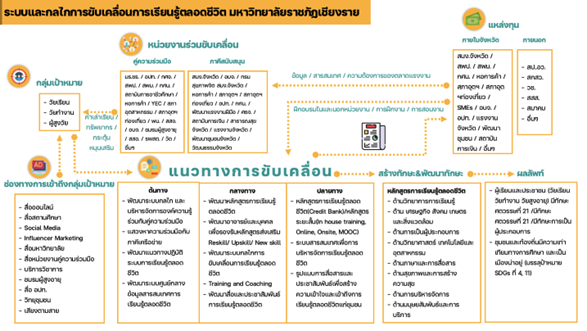Lifelong Learning Management for Sustainable Local Development in the Chiang Rai Rajabhat University’s Context
DOI:
https://doi.org/10.14456/educu.2024.20Keywords:
lifelong learning management, sustainable local development, lifelong learningAbstract
The objectives of this research are: 1) to adjust the administrative system to support lifelong learning; 2) to develop systems and mechanisms to drive sustainable lifelong learning for communities and localities; and 3) to prepare to drive lifelong learning at Chiang Rai Rajabhat University. The data collection includes lifelong education experts, university administrators, and credit bank committees, totaling twenty-five people; outsiders, totaling one hundred and forty people; participation in the course promoting lifelong learning by university personnel, totaling two hundred and fifteen people; and the general public, totaling two hundred and sixty people. The results are as follows: 1.) A strategic plan for developing lifelong learning for local development, a five-year plan, one copy, and organization of a lifelong learning management system by the regulations for operating a credit bank in higher education, and regulations concerning credit transfer, academic performance, learning outcomes, and credit transfer for experiences in the credit bank system. 2.) A driving mechanism system with fifty-one lifelong learning partnership networks in Chiang Rai Province, one operation manual, and one lifelong learning information system. 3.) The number of personnel preparing to create a curriculum to promote lifelong learning skills, totaling two hundred and fifteen; lifelong learning courses, totaling twenty courses, are located in the public relations information system database; a pilot trial of five courses was given to the general public in the local area, totaling two hundred and sixty trainees.
References
ภาษาไทย
ดุษณี คำมี. (2557). การศึกษาตลอดชีวิต : พัฒนาสังคมไทยสู่สังคมแห่งการเรียนรู้. สืบค้นเมื่อ 13 มิถุนายน 2567. จาก Digital File Mahidol R2R e-Journal. doi.nrct.go.th/ListDoi/Download/…
บุญเลี้ยง ทุมทอง. (2554). การพัฒนาหลักสูตร. กรุงเทพฯ : สำนักพิมพ์แห่งจุฬาลงกรณ์มหาวิทยาลัย.
มานิตย์ ซาชิโย. (2555). รูปแบบการเรียนรู้ตลอดชีวิตของคนหลายวัยในศูนย์ตุ้มโฮมลูกหลานบ้านเหล่าลิง. วารสารวิจัย มข, 2(3), 283-297.
สำนักงานสภานโยบายการอุดมศึกษา วิทยาศาสตร์ วิจัยและนวัตกรรมแห่งชาติ (สอวช.). (2565). การส่งเสริมการเรียนรู้ตลอดชีวิตเพื่อรองรับการพลิกโฉมฉับพลันและวิกฤตการณ์โลก. https://www.nxpo.or.th/th/report/9519/
ศักรินทร์ ชนประชา. (2562). การศึกษาตลอดชีวิต. วารสารอัล-นูร บัณฑิตวิทยาลัย มหาวิทยาลัยฬาฏอนี. 14(26), 167-179.
ภาษาอังกฤษ
UNESCO. (2024). UNESCO Global Network of Learning Cities. Institute for Lifelong Learning.
Pollasee, S. (2006). Networked learning community development. (In Thai). 2nd edition Bangkok: Odeon Store.
R.H..Dave. (1976). Foundations of Lifelong Education. Studies in Lifelong Education. Oxford: UNESCO Institute for Education and Pergamon Press.
Taba, H. (1962). Curriculum Development: Theory and Practice. New York: Harcourt, Brace and World.
Cropley A. J., & Dave R. H. (1978). Lifelong education and the training of teachers: Developing a Curriculum for teacher education on the basis of the principles of lifelong Education. Oxford: Pergamon.

Downloads
Published
How to Cite
Issue
Section
License

This work is licensed under a Creative Commons Attribution-NonCommercial-NoDerivatives 4.0 International License.



